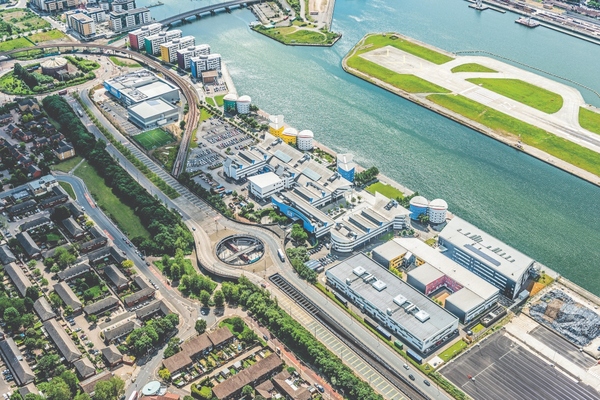Siemens helps university to decarbonise buildings
Energy-efficiency improvement measures aim to immediately cut 10 per cent of the University of East London’s carbon emissions with the goal of achieving net-zero by 2030.
The University of East London (UEL) in the UK has entered a strategic partnership with Siemens to collaborate on its aspiration of achieving net-zero carbon by 2030.
Siemens will deliver improvement measures to reduce overall energy use, and engineer solutions to drive the shift to renewable and on-site low-carbon energy generation at UEL’s campuses in the London Docklands and Stratford.
Green energy hub
Looking ahead to the second phase of the partnership, Siemens will support UEL in the creation of an innovation hub for local green energy enterprises, giving students the opportunity to engage with the latest green technologies on-campus. Students will also be able to further strengthen their skills through mentoring and internships with Siemens.
UEL and Siemens will work together to embed sustainability across the curriculum, allowing students to develop the skills they need to succeed in a green economy. The partnership is also exploring the creation of a Living Lab, to make campus data available to students and researchers for teaching and research.
Meanwhile, the first phase will immediately cut 10 percent of UEL’s carbon emissions and reduce operational costs by installing LED lighting in all buildings, and upgrading the building management systems (BMS).
“With our university-student-industry triple helix partnership approach, we are confident that we can achieve net-zero in our publicly engaged and vibrant learning environment where everyone can succeed”
A second workstream will focus on engineering the design of sustainable energy technology, including solar panels on rooftops and in car parks, ground source or water source heat pumps fed by the River Thames, and electric vehicle charging solutions.
In addition to targeting net-zero for the university’s urban sites by 2030, the partnership also aims to enhance the wellbeing of students and staff, foster inclusivity by creating new learning opportunities, and to support a digital-first culture through the roll-out of technology.
“With our university-student-industry triple helix partnership approach, we are confident that we can achieve net-zero in our publicly engaged and vibrant learning environment where everyone can succeed.”
She continued: “The campus carbon transformation will give our students the opportunity to become the sustainability leaders of tomorrow. They will have access to the latest thinking in smart technology, to industry experience and mentorships and a vital edge in the jobs market.”
To support the energy transition in the wider East London area, UEL and Siemens will also explore ways to introduce local-scale energy projects which make an immediate difference to local communities.
“The campus carbon transformation will give our students the opportunity to become the sustainability leaders of tomorrow”
“This is an exciting time for the University of East London; we’re proud to be supporting their strategic objectives with technology solutions, and collaborating on the transition to net-zero,” said Constantin Ginet, global head of energy and performance services, Siemens Smart Infrastructure.
“Beyond decarbonisation, this partnership also demonstrates the additional positive impact of a technology-focused net-zero journey, including improvements in learning and teaching, a better experience on campus for both students and staff, and the potential to create positive social impact in the surrounding community.”




Leave A Comment